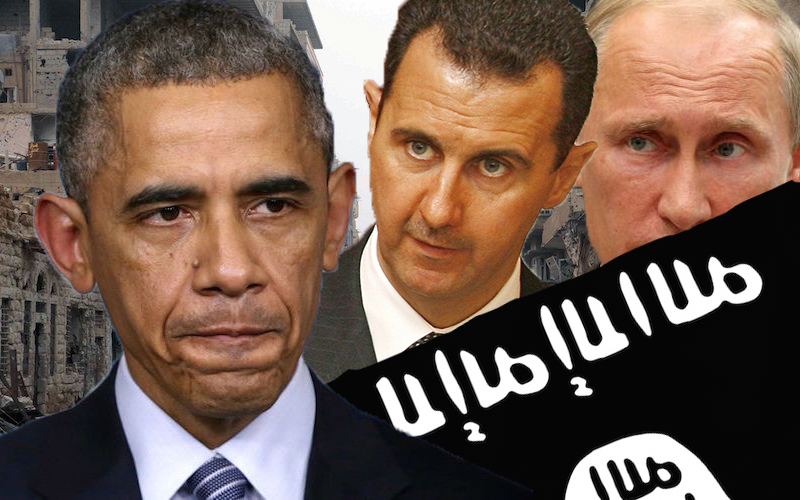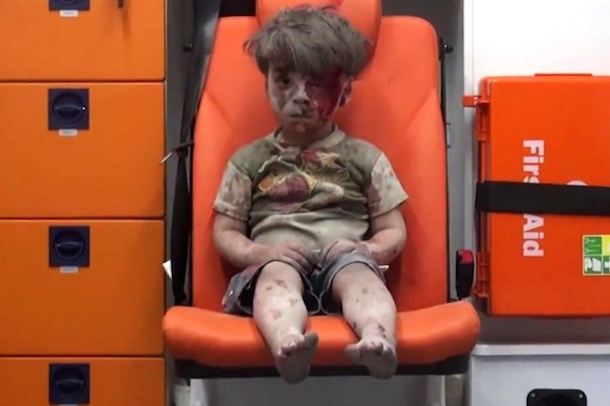
Syria as a Global Battleground: More Actors, More Interests, More Problems
Syria is a global battleground. Countries and non-state networks are using the civil war to accomplish their political goals with uninhibited use of force. As a result, the conflict has widened significantly and has taken on a life of its own. Countries like the United States, Russia, Iran and Saudi Arabia and political networks like Hezbollah and Islamic State, are all using the conflict to wage their own fight with others. As a consequence, I see no end in sight.
There are a startling number of states currently involved in the Syria crisis. Many states are in direct confrontation with others. On one hand, there is Russia, on the other the United States and other European countries. Russian forces are fighting alongside the Assad regime while the United States is backing an assortment of rebels. Russian forces often bomb US allies in the region while the US has in the past bombed Assad’s forces. More important is how these alliances were formed before Islamic State came into existence. Now, instead of coordinating efforts to neutralize the target, the Islamic State, Russia and the United States have stubbornly maintained now consolidated positions. The conflict between these two powers is about influence and prestige as each great power is seeking to best the other as part of a wider conflict over global influence.
Other involved states include Turkey, Saudi Arabia and Iran. These states are all fighting their own particular battles independent of Islamic State. Turkey is currently launching a campaign against the Kurds who happen to be allied to the United States. All Kurdish groups have conveniently been lumped into the terrorist category regardless of their vanguard against the Islamic State. This act has effectively made them ripe for slaughter by the Turkish government. The war in Syria serves as a divine opportunity to destroy Kurdish groups once and for all even if they are vital to the war against Islamic State and post-war Syria and Iraq.
Saudi Arabia and Iran are themselves locked in their own confrontation. All over the Middle East, in particular Lebanon, Iraq and Yemen, these two regional powers are fighting a “Cold War” type conflict, positioning themselves for regional supremacy. Their conflict over power and influence (not an ancient Sunni/Shia’ rivalry) has bled into areas of coordination such as OPEC. In Syria, Iran continues to support the Assad regime while Saudi Arabia sponsor Sunni rebels, some of the more militant, Jihadi variety. These funds have made their way into the pockets of Islamic State fighters. Michael Stephens, director of the Royal United Services Institute in Qatar, understands this dynamic: “…some wealthy individuals from the Gulf have funded extremist groups in Syria, many taking bags of cash to Turkey and simply handing over millions of dollars at a time. This was an extremely common practice in 2012 and 2013 but has since diminished and is at most only a tiny percentage of the total income that flows into Islamic State coffers in 2014.” Ultimately, Saudi Arabia supports the Islamic State to balance against Shia’ strength in Iraq and Syria, regardless of the great cost to human life. From this, we can determine that non-state networks wield considerable force in Syria.

Non-state networks, Saudi Arabian backed groups like al-Nusra and Islamic State, as well as Iranian supported Hezbollah, are fundamental to understanding the unrelenting conflict. Their involvement must be understood as they relate to their state sponsors but also independently. I refer to these groups as networks, not actors. Unlike single unitary actors, such as states, there is little centralization. Affiliations are not as clear cut as many in the west want to see them. So while Gulf countries may deny funding Islamic State, monies and resources may end up in their pockets. Non-state networks in Syria are the ground troops backed and supported by all states involved.
Islamic State is a unit of governance that straddles the line between a state and a political network. While there is a central government that holds a monopoly on the use of violence over territory, their influence cuts, or is networked, across states. The Islamic State now operates from Nigeria to Malaysia and carries out operations in the United States, Russia and much of Europe. If a state, like France, suffers an attack by Islamic State, bombing them in Syria and Iraq will not curb their presence in France or elsewhere. The Islamic State wants to be attacked so that potential followers will strengthen their resolve. They pray for a Donald Trump presidency to increase their legitimacy. When Trump advocates the murder of the families of Islamic State members, this only forces people to join Islamic State to seek protection. The situation is far more complex than we would like to imagine which adds to the difficulty.
We may begin to understand the Syrian situation further if we remember another conflict: the fifteen year Lebanese Civil War. Beginning in 1975 (arguably), the conflict was initially limited between Lebanese Christian groups seeking to protect the status quo and Palestinian groups. It eventually spilled over given atrocities and as groups brought in other players to strengthen their positions. These foreign powers brought their own interests with them. As a result, the conflict took on multiple meanings. Israel tried to rid themselves of the PLO while keeping the Syrians at bay, whereas Russian and Syrian forces tried to balance against Israeli, French and American domination in the region through their Lebanese proxies. To add to the complication, the freshly minted Islamic Republic of Iran entered the fray with Hezbollah who had their own fundamentalist agenda even against AMAL, their more secular Lebanese Shia’ brothers. Such was a pointless war only worsened by outsiders seeking to defend their political interests by freely using force.
Similarly, Syria is now the frontline of a global battlefield, where a number states and networks with their own ambitions and interests find themselves. The civil war incorporates several global conflicts and, as such, there is little hope for its end. The actors involved will not withdraw unless the others do; but why would anyone withdraw? The reason is simple: the chances of direct confrontation between major players remains a clear and present danger. In November 2015, Turkey shot down a Russian fighter jet because it violated its airspace. Russia could have retaliated and escalated the matter. Moreover, as a member of NATO, the United States may have responded. At that point, we could have been dealing with a Franz Ferdinand moment; it would have been as easy as that.
The likelihood of an accident leading to full-scale war increases as states increase their presence in Syria. How can players avoid this outcome? Here, I see three options. The first is the status quo. It may seem completely necessary for states to continue to defend their perceived interests all the while trying to avoid escalation. This would be your standard balance of power explanation. States would create security out of this arrangement if each had their own sphere of influence in Syria. This would require Syria’s physical occupation by each of the foreign powers for an undetermined amount of time. This may force an end to hostilities sort of like the occupation of Germany by foreign powers. It may also worsen the situation extraordinarily as people do not enjoy being occupied. It’s the reason the world is dealing with the Islamic State in the first place. Regardless, such an equation requires intense and serious negotiations which would include the Assad government.
The second: states should begin to consider stepping back, especially the United States. The old adage “Too many cooks spoil the broth” rings true. The United States successfully did this in 2013 after the horrible gas attack perpetrated by the Assad regime. It was wise on the part of President Obama to withdraw from his “red line” statement. With Russia, a negotiated settlement was reached to avoid a direct assault on Assad. While this may seemingly make President Obama look weak due to lost credibility, in the longer term, this option was a better one.
Departure may be completely unrealistic because a withdrawal of one party will mean victory for those who remain. For instance, if Russia were to withdraw, it would be surrendering influence to the United States. However, in reality, Russia has already withdrawn only to re-engage. It really depends how one spins a story. The point here is that withdrawal is certainly an option; let someone else take care of it.
The third: a negotiated end to the violence and the containment of Islamic State. A coordinated effort to cut off the Islamic State from the outside world and restore order to Syria may serve as a productive beginning of the end to the conflict. All sources of funding must be targeted. This of course requires foreign powers to coordinate their power for a resolution. Michael Stephens discusses the major difficulty with this proposition given the problems posed by the number of actors’ interests involved: “The point is that Islamic State is essentially self-financing; it cannot be isolated and cut off from the world because it is intimately tied into regional stability in a way that benefits not only itself, but also the people it fights.”
In this way, the Syrian conflict has become much more than a simple fight against the Assad regime. There is far more at stake for all the competing powers fighting there: power, influence and prestige for the United States and Russia; liquidation of Kurdish nationalism for Turkey; regional domination for Iran and Saudi Arabia. The major losers in all this are the Syrian people.
In terms of the day after, as much as many (including myself) would hate to admit, the poison gas wielding Assad regime may be necessary to maintain stability and security in Syria in a post-war environment. Given this admission, there really are no good guys in this story. Syria has never before been the subject of such a tragedy. A once beautiful country now has to try to achieve some peace between the leadership and its people. Questions of amnesty and forgiveness for the sake of rebuilding come to mind. The children of Syria, especially direct victims of the violence, will be in dire need of health and education services, as well as counseling in the decades to come. The government will have to deal with a lost generation. Achieving peace will seem like the easy part. The day after will prove more challenging, not only for Syria, but for the world.

